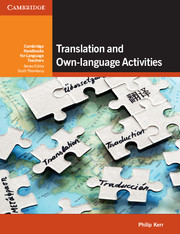Book contents
Summary
Strength of feelings
The use of the student's own language is a very hot potato in language teaching. Thornbury (2013) has claimed that no other issue has so polarised opinion in the field. In some institutions, it is completely banned and teachers can lose their jobs if they are caught transgressing. The strength of feeling is, however, mostly one-sided: until very recently, the voice of disapproval has been rather louder than the voice of acceptance.
One of the main problems in this debate is that a number of issues have been conflated. In the minds of some, any mention of own-language use evokes the word ‘translation’, even if translation is just one instance of own-language use. ‘Translation’ has become a taboo word in language teaching. For example, Goldstein (2010) has described how he incorporated elements of contrastive analysis (see Chapter 7) in one series of books. When it was time for a second edition of the books to be prepared, these elements remained, but he was instructed to change the rubrics in order to eliminate the word ‘translation’ by using paraphrases such as ‘How would you say this in your language?’. It was not the idea, he said, ‘but the “t” word which was considered taboo’.
Translation suffers because it is associated with grammar-translation, which is sometimes portrayed as representing everything that is bad about language teaching. However, criticisms of grammar-translation have tended to focus selectively on a limited number of the techniques of this approach. A fair evaluation will only be possible if there is further research into the relative effectiveness of grammar-translation and the more communicative approaches that came after it.
There is a wide spectrum of uses of the learner's own language in language teaching, ranging from occasional clarification of meaning to running the whole lesson. There is also an important difference between teacher and learner use of this language. In the criticisms of translation/own-language use, there is rarely much attention to details and own-language moments are not differentiated adequately. Instead, own-language moments are regarded as if they are all serving the same purpose.
- Type
- Chapter
- Information
- Translation and Own-language Activities , pp. 37 - 46Publisher: Cambridge University PressPrint publication year: 2014



